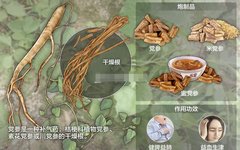| Dang Shen (Codonopsis pilosula) is a traditional Chinese medicine that belongs to the category of Qi-tonifying herbs. It has a sweet flavor and a neutral nature, with effects that tonify Qi and essence, nourish blood and yin, generate fluids and quench thirst, and strengthen the spleen and heart. Using Dang Shen in medicinal preparations or dietary dishes can treat lung deficiency with shortness of breath and cough, and it can also enhance the digestive absorption function of the gastrointestinal tract. It is contraindicated for those with excessive liver fire or Qi stagnation. |
What the doctor says:
1. Efficacy and Functions: Tonifying Qi, Strengthening the Spleen and Lung, Generating Fluids
Dang Shen is the dried root of the plant Codonopsis pilosula (Franch.) Nannf., which belongs to the Campanulaceae family. It has a sweet flavor, a neutral nature, and enters the spleen and lung meridians, exhibiting effects such as tonifying Qi, strengthening the spleen and lung, and generating fluids.
1. Tonifying Qi: Dang Shen has a sweet flavor and a neutral nature, which helps to tonify Qi, suitable for those with Qi deficiency. It is commonly used clinically to treat symptoms such as shortness of breath, palpitations, deficiency of both Qi and blood, fatigue, and prolapse of the rectum.
2. Strengthening the Spleen and Lung: Dang Shen enters the spleen and lung meridians, effectively alleviating symptoms of spleen and lung deficiency, such as poor appetite, loose stools, and weak cough. It is often cooked together with Sha Shen (Adenophorae Radix) and Longan (Dimocarpus longan) for enhanced effects.
3. Generating Fluids: Dang Shen has the ability to generate fluids and quench thirst, making it useful for treating internal heat and thirst. It can also improve symptoms such as shortness of breath, thirst, dry throat, and excessive thirst caused by over-talking, which depletes Qi and fluids.
2. Precautions
1. Suitable Population: Those with Qi and blood deficiency, weak spleen and stomach, and fatigue in the limbs.
2. Contraindicated Population: Those with excess conditions, heat syndromes, or true deficiency with evil excess.
3. Foods to Avoid: Li Lu (Veratrum) and white radish.
Dang Shen and Li Lu are contraindicated to be used together, as they belong to the category of eighteen oppositions in traditional Chinese medicine. They should not be consumed simultaneously. Dang Shen should not be used with white radish, as their nutritional effects counteract each other, affecting the tonifying effects of Dang Shen.
4. Consumption Method: Infusion, mix Dang Shen, Goji berries, and white liquor in a wide-mouthed bottle, seal it, and let it steep for over a week before consumption.
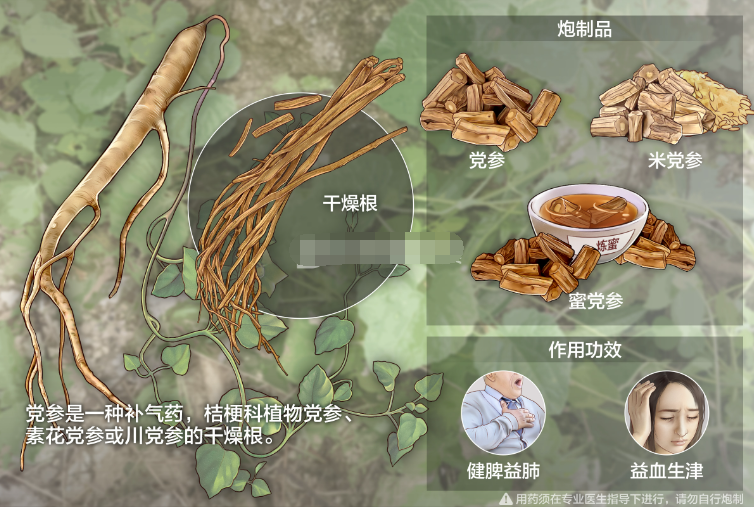
[Pharmacological Knowledge]
[Chinese Medicine Name] Dang Shen (Codonopsis pilosula)
[Alias] Tiao Dang, Dan Zhi Dang, Banqiao Dang, Fang Dang Shen, Shang Dang Shen, Shi Tou Shen, Zhong Ling Cao, Huang Shen.
[Medicinal Part] The dried root of the plant Codonopsis pilosula (Franch.) Nannf., Codonopsis pilosula Nannf. var. modesta (Nannf.) L.T. Shen, or Codonopsis tangshen Oliv.
[Geographical Distribution] Grows in shrub areas at altitudes of 900 to 2300 meters, with extensive cultivation. Distributed in Hubei, Hunan, Sichuan, Guizhou, and other regions.
[Harvesting and Processing] Harvest the roots that are over three years old in autumn, wash them, and dry them.
[Pharmacological Research] Enhances the body’s stress response and immune function, delays aging, has anti-ulcer effects, increases the tension of isolated guinea pig and rabbit intestines, and enhances contraction. It can antagonize serotonin-induced intestinal contraction but has no significant effect on acetylcholine-induced contraction. It significantly reduces spontaneous activity in mice, prolongs sleep time induced by pentobarbital sodium or cyclohexyl barbiturate, and improves or enhances memory acquisition and consolidation in mice. It can increase the number of red blood cells and hemoglobin in rabbits while reducing the total white blood cell count. It also exhibits anti-tumor, hyperglycemic, and antibacterial effects. The water decoction of Dang Shen provides certain protective effects against cobalt-γ radiation in mice. Polysaccharides have significant antagonistic effects on various stress-induced ulcers in experimental animals. Dang Shen injection has effects on anti-myocardial ischemia and hypoxia.
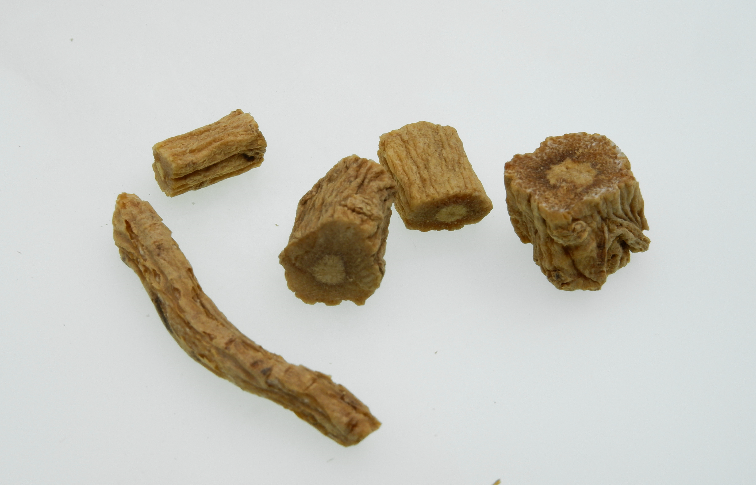
——– Efficacy and Compatibility ——–
[Nature and Flavor] Neutral, sweet. Enters the spleen and lung meridians.
[Efficacy and Functions] Tonifying Qi, strengthening the spleen and lung. It is classified as a Qi-tonifying herb under the category of tonifying herbs.
[Clinical Application] Dosage of 9 to 30 grams, decocted for oral administration; or made into a paste, pills, or powders. For generating fluids and nourishing blood, it is best used raw; for tonifying the spleen and lung, it is best used roasted. Used to treat spleen and lung deficiency, shortness of breath, palpitations, poor appetite, loose stools, weak cough, and internal heat thirst.
[Usage Contraindications] Contraindicated for excess conditions and heat syndromes; not suitable for true deficiency with evil excess, and should not be used alone with Li Lu.
[Compatible Formulas] For reference only
1. Clear lung Qi, tonify original Qi, open the voice, and assist muscle strength: 1 pound of Dang Shen (soft and sweet, sliced), half a pound of Sha Shen (sliced), and 4 ounces of Longan meat. Decoct to a concentrated juice, drop water until it forms beads, and store in a porcelain container. Each time, take a wine cup, mix with boiling water, or add to the decoction. (From “De Pei Ben Cao” Dang Shen Paste)
2. For treating children’s spontaneous sweating: Use 30 grams of Dang Shen and 20 grams of Huang Qi (Astragalus). Decoct to 50 milliliters, divided into 3 doses, halving for children under 1 year old. [“Jiangsu Traditional Chinese Medicine” 1988, (9): 25]
3. For treating damage to the spleen and stomach caused by cold and harsh agents, leading to sores in the mouth and tongue: 6 grams each of roasted Dang Shen and roasted Huang Qi, 3 grams of Fu Ling (Poria), 1.5 grams of raw Gan Cao (Licorice), and 2.1 grams of Bai Shao (White Peony). Decoct in plain water and take warm. (From “Throat Collection of Zizhen” Shen Qi An Wei San)
4. For treating oral sores in children: 30 grams of Dang Shen and 15 grams of Huang Bai (Phellodendron). Grind into a fine powder and apply to the affected area. (From “Compilation of Proven Recipes from Qinghai Province”)
5. For treating prolapse of the rectum: 30 grams of Dang Shen, 9 grams of Sheng Ma (Cimicifuga), and 6 grams of Gan Cao. Decoct twice, once in the morning and once in the evening. (From “Compilation of National Herbal Medicine”)
[Preparation Methods]
-
Dang Shen: Take the original herb, remove the fibrous roots, wash clean, moisten thoroughly, slice thickly, and dry.
-
Rice Dang Shen: Place rice in a frying pan, heat over medium fire until smoke appears, add raw Dang Shen slices, and fry until the rice turns a yellowish color. Remove, sift out the rice, and cool. Use 20 kg of rice for every 100 kg of Dang Shen.
-
Honey Dang Shen: Dilute an appropriate amount of honey with water, mix with Dang Shen slices, let it soak, and heat gently in a frying pan until it turns yellow-brown and is not sticky. Use 20 kg of honey for every 100 kg of Dang Shen.
-
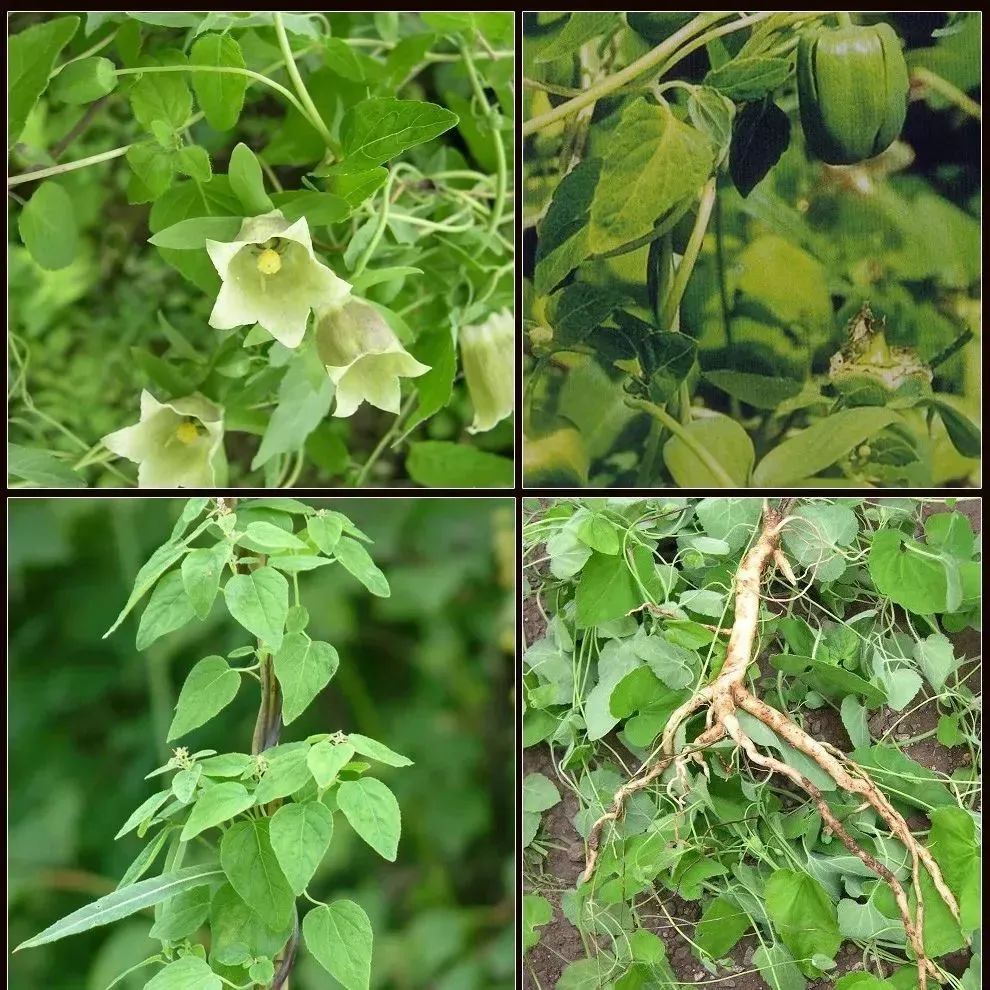
Compound Preparations
Formulas containing Dang Shen
Bu Zhong Yi Qi Wan:
Tonifies Qi and lifts Yang. Used for diarrhea, prolapse of the rectum, and uterine prolapse caused by spleen and stomach deficiency, with symptoms of fatigue, poor appetite, abdominal distension, loose stools, and rectal or uterine prolapse.
Li Zhong Wan:
Warms the middle, disperses cold, and strengthens the stomach. Used for spleen and stomach deficiency with cold, vomiting, diarrhea, chest fullness, abdominal pain, and indigestion.
Shen Su Wan:
Tonifies Qi, releases the exterior, disperses wind and cold, and stops cough. Used for weakness and colds caused by wind and cold, with symptoms of chills, fever, headache, nasal congestion, cough with phlegm, chest tightness, nausea, and fatigue.
Ba Zhen Wan:
Tonifies Qi and nourishes blood. Used for deficiency of both Qi and blood, with symptoms of pale complexion, poor appetite, fatigue, and excessive menstruation.
Jian Pi Wan:
Strengthens the spleen and opens the appetite. Used for spleen and stomach deficiency with abdominal distension and poor appetite.
Bu Pi Yi Chang Wan:
Tonifies Qi and nourishes blood, warms Yang, promotes Qi movement, and astringes the intestines to stop diarrhea. Used for diarrhea caused by spleen deficiency and Qi stagnation, with symptoms of abdominal distension and pain, intestinal rumbling, diarrhea with mucus and blood; chronic colitis, ulcerative colitis, and allergic colitis with the above symptoms.
How to Differentiate the Use of Dang Shen?
Ren Shen (Ginseng) and Dang Shen
Both Ren Shen and Dang Shen have the functions of tonifying spleen Qi, lung Qi, generating fluids, nourishing blood, and supporting the righteous Qi while dispelling evil. They can be used for symptoms of spleen Qi deficiency, lung Qi deficiency, fluid damage leading to thirst, diabetes, blood deficiency, and Qi deficiency with evil excess.
Dang Shen has a sweet and neutral nature, with a mild effect and weaker potency. It can be used in larger doses to replace Ren Shen for treating mild symptoms and chronic patients, while Ren Shen is preferred for acute and severe cases.
However, Dang Shen does not possess the rescuing effects of Ren Shen for Qi collapse; for cases of original Qi collapse, Ren Shen should be used for urgent rescue, and Dang Shen cannot replace it. Additionally, Ren Shen excels in tonifying Qi, assisting Yang, calming the spirit, and enhancing intelligence, while Dang Shen does not exhibit these effects as prominently but has the added benefit of nourishing blood.
Precautions
Dang Shen should not be used with Li Lu.
-
Contraindicated for those with Qi stagnation or excessive anger; avoid in cases of fullness with heat.
-
Pregnant and nursing women: If you are pregnant, planning to become pregnant, or nursing, please inform your doctor and consult whether TCM treatment is appropriate.
-
Children: Medication for children should be conducted under the guidance of a physician and adult supervision.
-
Please store medicinal materials properly and do not share your medications with others.
| ===== Previous Classics ===========Traditional Chinese Medicine – The Efficacy of Floating Wheat (Clearing Deficiency Heat, Tonifying Qi, Stopping Sweating)‘Traditional Chinese Medicine – The Efficacy and Contraindications of Ma Bo (Bovista)Traditional Chinese Medicine – The Efficacy of Yuganzi (Clearing Heat and Cooling Blood, Aiding Digestion and Strengthening the Stomach, Generating Fluids and Stopping Cough)Traditional Chinese Medicine – The Efficacy and Contraindications of Mahuang Gen (Ephedra Root)Traditional Chinese Medicine – The Efficacy and Contraindications of ChrysanthemumTraditional Chinese Medicine – The Efficacy and Functions of He Huan Pi (Albizia Bark)Traditional Chinese Medicine – The Efficacy and Contraindications of Bai Zi Ren (Platycladus Seed)Traditional Chinese Medicine – The Efficacy and Contraindications of Shang Lu (Phytolacca)“Luo Han Wo” Qigong (Gathering Kidney Qi, Strengthening the Lumbar Spine, Quickly Supplementing Kidney Yang Qi)Formula – Chuan Xiong Cha Tiao San (Relieving Headaches Caused by External Wind Evil, or Alleviating Symptoms of Chills, Fever, Nasal Congestion)Self-made medicines from major hospitals in Beijing (internal medicines) are powerful, strongly recommended for collection. |
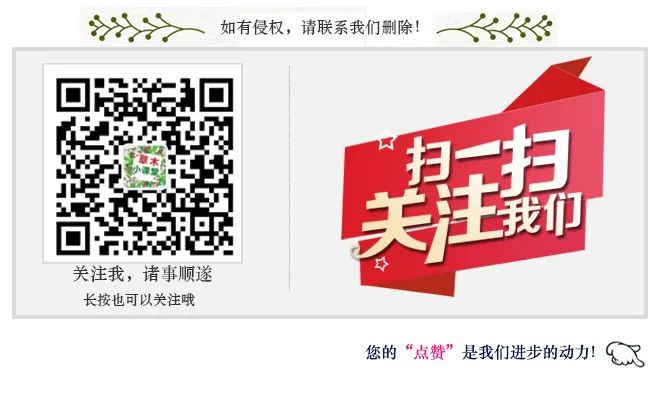
Note: Please do not use medications without a doctor’s advice.

